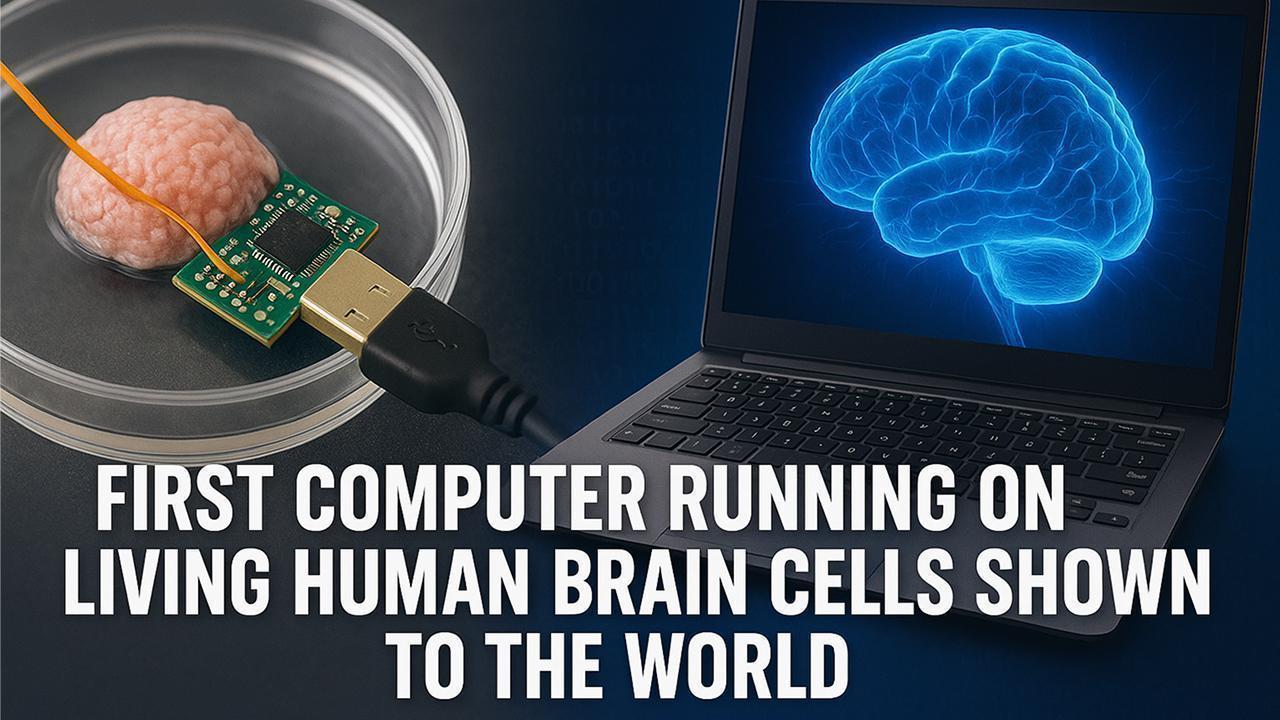
Post by : Rajat Arora
First Computer Running on Living Human Brain Cells Shown to the World
In a moment that feels straight out of science fiction, scientists have officially unveiled the first computer running on living human brain cells. This revolutionary breakthrough blends biology and technology in a way we’ve never seen before, setting the stage for a future where machines are not just silicon and code — but also living tissue.
But how exactly does this work? Why are researchers turning to brain cells instead of traditional circuits? And what does this mean for the future of computing, artificial intelligence, and even human health?
Let’s break it all down.
What Is This Bio-Computer, and How Does It Work?
The first computer running on human brain cells, often called a biocomputer, uses a collection of lab-grown neurons — human brain cells cultivated in a dish — connected to electronic systems.
These neurons communicate with each other just like they do inside our brains, generating electrical signals, forming connections (synapses), and adapting over time. Researchers use specialized interfaces to link these biological networks to computers, allowing the system to process information, learn patterns, and even solve tasks.
This isn’t just a fancy experiment — it’s a whole new type of machine. Instead of relying solely on microchips, the first computer running on living brain cells blends the adaptability of biological systems with the precision of digital circuits.
Why Use Living Brain Cells in a Computer?
Traditional computers, even the most powerful supercomputers, have limitations. They process tasks sequentially, burn huge amounts of energy, and struggle to mimic the adaptability and parallel processing power of the human brain.
Here’s where bio-computing shines:
Energy efficiency — The human brain operates on just 20 watts of power, compared to megawatts consumed by large data centers.
Learning capability — Neurons naturally rewire and strengthen their connections based on experience, offering unmatched learning and adaptability.
Parallel processing — While digital systems process one operation at a time, brain networks handle countless operations simultaneously.
By integrating living cells, the first computer running on human neurons promises not only raw computational power but also a system that can learn, adapt, and potentially solve problems in entirely new ways.
What Did Scientists Reveal?
During the official demonstration, scientists showed that this biocomputer could:
Recognize patterns — The system was able to “learn” how to respond to specific inputs over time, just like a simple brain would.Adapt to changes — Unlike traditional computers that need reprogramming, the neuron-based system adjusted its behavior when the environment shifted.Store information — Researchers observed that the living brain cells could hold and retrieve information, pointing to possible future memory systems.
One of the lead researchers said,“This is not about replacing silicon-based computers, but about exploring hybrid systems where biology and technology can complement each other.”
In short, the first computer running on living brain cells is a proof of concept — but its potential is enormous.
What Could This Mean for the Future?
This breakthrough opens up fascinating possibilities across multiple fields:
Artificial Intelligence — Imagine AI systems that aren’t just coded but are partially grown, learning and adapting in ways we currently can’t program.
Medical research — These systems could help us understand brain diseases like Alzheimer’s, by providing live, testable models.
Energy-efficient computing — Data centers are energy-hungry giants; integrating biocomputing could dramatically cut power consumption.
Ethical and philosophical questions — As machines become part-living, we’ll need to rethink what “consciousness” and “machine intelligence” really mean.
While it’s still early days, the first computer running on living neurons marks the start of a new chapter in technology.
Are There Risks or Challenges?
Of course, such groundbreaking technology comes with challenges.
Scalability — Right now, these systems are tiny. Scaling up to match modern computers will take years, if not decades.Ethical concerns — Using human brain cells in machines raises serious ethical questions: Are we creating life? Could these systems develop awareness?Stability — Living cells are delicate, requiring precise environments to survive and function over time.
Scientists are moving cautiously, ensuring that progress is matched with ethical oversight.
Disclaimer
The information provided in this article is for general informational purposes only. While DXB News Network strives to ensure accuracy and reliability, we make no guarantees regarding the completeness, timeliness, or accuracy of the content. Opinions expressed are those of the authors and do not necessarily reflect the views of DXB News Network.
Photo: Chatgpt

Numou Launches Procurement Financing to Support SMEs in Abu Dhabi
The new Procurement Financing by Numou aids UAE SMEs in overcoming cash flow hurdles, enhancing acce

Elon Musk Envisions a Future Where AI Takes Over All Jobs, Liberating Humanity
Elon Musk predicts that AI and robots will supplant jobs, granting people freedom and a universal in

Djokovic Opts Out of 2025 Paris Masters Tournament
Novak Djokovic revealed he'll miss the 2025 Paris Masters, reminiscing about past victories without

AT&T Exceeds Subscriber Expectations with iPhone 17 Campaign
In Q3, AT&T gains 405K wireless subscribers via iPhone 17 promotions, despite a slight revenue short

Mboko Shines Brightly to Reach Tokyo Quarter-Finals
In under an hour, 19-year-old Mboko secures her place in the Tokyo Quarter-Finals, showcasing precis

U.S. Economic Growth Surges Amid Uncertainty Over Data
The U.S. GDP has risen by 3.9% in Q3, yet concerns about a government shutdown and labor market issu

Zimbabwe Celebrates Historic Test Triumph Over Afghanistan
Zimbabwe marked its first home Test win in a decade, dominating Afghanistan by an innings and 73 run

Mboko Shines Brightly to Reach Tokyo Quarter-Finals
In under an hour, 19-year-old Mboko secures her place in the Tokyo Quarter-Finals, showcasing precis

Zimbabwe Celebrates Historic Test Triumph Over Afghanistan
Zimbabwe marked its first home Test win in a decade, dominating Afghanistan by an innings and 73 run

Dodgers Reveal Pitching Lineup for World Series Clash with Blue Jays
Dodgers' manager Dave Roberts has revealed the World Series starters, with Blake Snell taking Game 1

Warriors Defeat Lakers; Thunder Triumph in Epic Triple Overtime
Warriors claim victory over Lakers 119-109; Thunder win an intense triple OT thriller against Rocket

Mumbai Singer Actor Rishabh Tandon Dies Suddenly at 35
Mumbai’s singer actor Rishabh Tandon dies at 35 after a sudden heart attack in Delhi leaving fans an

Renshaw Prioritizes Personal Growth Over Ashes Buzz
Matt Renshaw emphasizes self-improvement over Ashes discussions as he aims for a Test comeback.

Arctic Athleisure Stylish Performance Wear for Urban Winters
Discover Arctic Athleisure where high performance fabrics meet urban style for warm comfortable and

Ponting Stands Firm on Kohli and Rohit Following ODI Setback
Ricky Ponting insists Virat Kohli and Rohit Sharma are still key players for India despite a recent